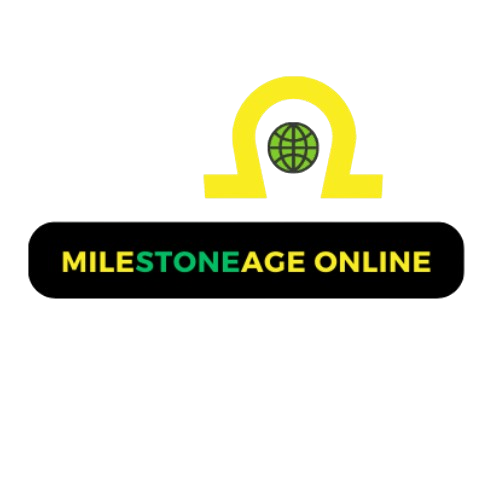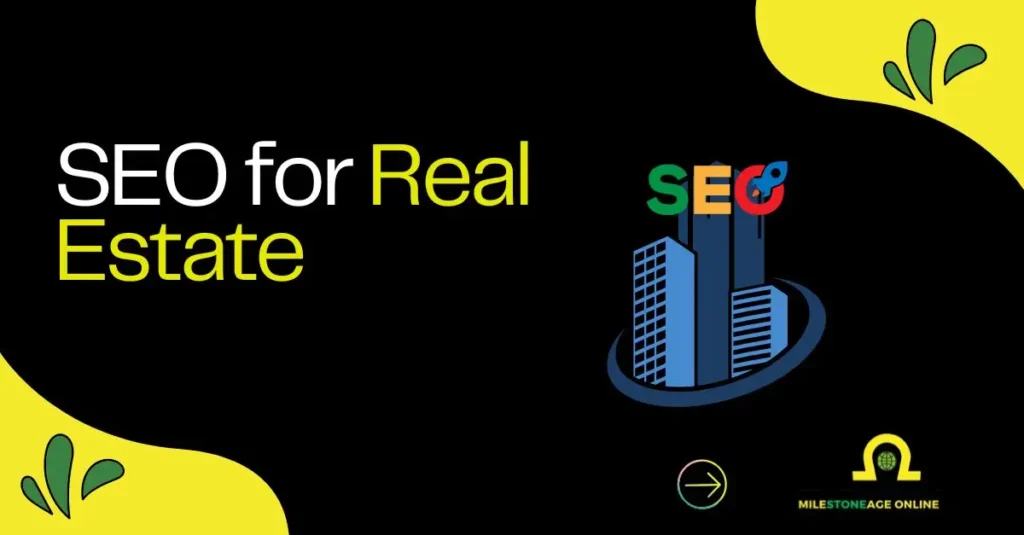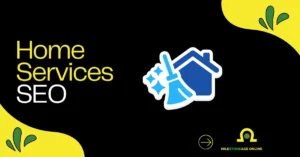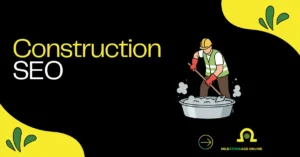SEO helps real estate agents and investors gain steady online visibility. It turns searches into leads by using proven steps and simple tools.
1 Define real estate SEO as ranking listings and services organically
2 Use keyword research with templates and pdf planners for structure
3 Apply local SEO with Google Business Profile, NAP, reviews, and maps
4 Add schema like RealEstateListing and build backlinks from local sources
5 Publish blogs, FAQs, and videos for content that converts leads
Together these actions create trust, traffic, and growth for real estate businesses.
Introduction
SEO for real estate is about getting seen where buyers and investors are already looking—on search engines. Most people start their property journey online, and they want quick, clear answers.
If your site does not appear, you lose leads. With the right steps, you can reach more people, bring steady traffic, and grow trust.
This guide keeps it simple and direct. We’ll move from keywords to local SEO, templates, and backlinks in a smooth flow.
Each step matters, and together they build strong online visibility for your real estate business.
Make Your Real Estate Site Shine with SEO
SEO makes your property site visible to buyers and investors. It helps bring steady leads through search.
SEO for real estate means using search engines to gain organic visibility. When your site ranks higher, more people find you and trust your listings. Studies show 97% of homebuyers use the internet when starting their search. This makes a strong online presence non-negotiable. Reports from Rentastic and Luxury Presence show how search visibility directly drives qualified leads.
● Organic reach: Target “real estate SEO keywords” to reach active buyers.
● Lead growth: Use the “best seo for real estate” strategies to convert clicks.
● Visibility: Build structured pages that search engines can read easily.
● Trust signals: Add local reviews, quality content, and secure browsing.
When these parts come together, your site draws attention without paid ads. This not only grows your leads but also builds credibility in competitive markets.
Why Agents and Investors Can’t Ignore Local SEO
Local SEO puts your services in front of ready buyers and renters. People now search with intent and act fast.
Searches like “best real estate agent in [City]” or “homes near me” continue to rise. In fact, “near me” searches have grown more than 900%. LPagery shows how local terms convert faster than broad searches.
● Local SEO for real estate: Add city names and neighborhood keywords to pages.
● Google Business Profile: Keep address, phone, and maps updated.
● Reviews: Ask clients for honest feedback to build trust.
● Real estate investor website builder: Choose platforms with local SEO options.
Ignoring local intent means losing high-quality leads to competitors. When buyers want answers fast, the agent who shows up locally gains the call.
Start Strong: Keyword Research & Templates
Keyword planning sets the base for all search growth. Good keywords bring in qualified buyers.
“Seo for real estate template” and “seo for real estate pdf” are starting points. They give a simple plan for picking search terms that matter. Tools like Google Keyword Planner, SEMrush, and Ahrefs make this task easier. They also show search volume and intent. With the right choices, you can rank faster and win long-term traffic.
● Research terms: Use buyer queries like “2 bedroom homes in [City]”.
● Track data: Find search volume and difficulty to set priorities.
● Plan content: Align pages with search demand for properties and advice.
● Check rivals: See what terms top agents already rank for.
Reports show that over 60% of clicks go to the top three results. This proves why keyword research matters so much.
Templates That Power Real Estate SEO
Templates save time and make sites rank faster. They give your content a ready structure.
Programmatic city-neighborhood pages are one example. They let you create multiple local pages quickly, while still looking natural. Listing schema works the same way by showing structured data to search engines.
● City Neighborhood Page Template: Build pages for each market you serve.
● RealEstateListing Schema: Mark up listings with price, address, and status.
● Content layout templates: Use tools like Fresh Proposals, Passionfruit, or even Etsy-style design packs for layouts.
Using templates lets you publish more with less effort. They also help keep your content consistent, readable, and optimized for real estate search.
On-Page and Technical SEO Essentials
On-page and technical SEO decide how well your site performs. Both matter for real estate rankings.
Heading structure is the starting point. H1, H2, and H3 tags help search engines read your pages. Reports from Passionfruit and Writesonic show structured content ranks higher and feeds AI tools with clear signals.
● On-page SEO: Add strong title tags, meta descriptions, and clean URLs.
● Internal links: Link to related listings and guides for better navigation.
● Alt text: Describe property photos with simple and direct words.
● Content flow: Use clear language that matches user intent.
Technical SEO makes sure your site runs fast and smooth. Rentastic, Carrot, and Luxury Presence show how mobile-friendly design leads to higher conversions.
● Mobile speed: Buyers search on phones, so your site must load quickly.
● Best real estate investor websites: Choose frameworks that support SEO out of the box.
● Secure site: Use HTTPS for safety and better trust.
● Clean build: GowerCrowd notes that simple code improves speed and crawlability.
When on-page and technical steps align, your site stands out. This builds long-term visibility and keeps your real estate business competitive.
Local SEO Tactics That Convert
Local SEO helps you reach people searching near their homes or offices. It drives real action because buyers contact agents they find first.
Google Business Profile is the strongest tool for local visibility. Carrot and LPagery show that when NAP details stay consistent, trust builds fast. Wix.com adds that photos and posts make profiles stand out.
● NAP consistency: Keep your name, address, and phone identical everywhere.
● Reviews: Collect client feedback to show proof of service.
● Photos: Add property shots and team images to build credibility.
● Posts: Share updates, open houses, and events.
Location pages with schema and maps are just as powerful. LPagery and Passionfruit show how schema tags support local search engines in reading pages. Adding maps connects buyers with directions quickly.
Stats prove the impact. Over 87% of buyers contact just one agent they find online. “Near me” searches continue to grow rapidly, showing intent and urgency.
These tactics work together to drive calls, visits, and sign-ups. By staying consistent and active, you secure more qualified local leads.
Schema & Backlinks: Build Authority
Search engines trust sites that show structure and earn strong links. Both are key for real estate growth.
Schema for real estate gives clear signals to search engines. Passionfruit highlights the use of Offer and PostalAddress tags. Even a real estate investor website builder can include schema for better ranking.
● RealEstateListing schema: Mark up price, status, and property type.
● Offer schema: Add details about promotions or special terms.
● PostalAddress schema: Keep local address data machine-readable.
Backlinks confirm credibility in search results. Canva, Paperless Pipeline, and LPagery show that citations, local directories, and press mentions still work.
● Citations: List your business on trusted directories.
● Local links: Get featured on community blogs or chambers of commerce.
● Press coverage: Share updates through regional media outlets.
Carrot and Passionfruit both note that Google values E-E-A-T and Core Web Vitals. Together, schema and backlinks give both technical trust and user trust. This mix improves rankings and helps your site hold authority.
Content That Converts: Blogs, FAQs & Video
Content answers buyer questions and drives long visits to your site. It creates trust and keeps people engaged.
High-value blogs cover local markets, pricing, and neighborhood guides. Writing about trends and simple how-to topics attracts both investors and renters.
● Blog posts: Write short, direct posts on buying, selling, and renting.
● Neighborhood guides: Add details about schools, parks, and transit.
● Market updates: Share local stats and forecasts to keep readers informed.
Video SEO is just as powerful. Luxury Presence shows how YouTube ranks videos in search. Add simple property tours and short Q&A clips. Use descriptive titles and captions to improve visibility.
FAQs give quick answers to common questions. They also help AI tools pull direct answers. By structuring FAQs with clear headings, you improve both ranking and user clarity.
Strong content not only converts but also supports local SEO. It makes your site an authority in your market.
Influencer Wisdom & Credible Proof
Trusted voices confirm that SEO works in real estate. Their words add weight and clarity.
Tyler Ford explains it well: “SEO is the exact opposite. They’re chasing you; you’re not chasing them.” Passionfruit and Carrot both reference how inbound leads stay stronger than cold calls.
Boost Leads with Smart Real Estate SEO Now
SEO gives real estate pros steady visibility. Use local keywords. Use optimized templates. Claim your Google Business profile.
Build schema-rich pages and earn backlinks. Share blog posts and video FAQs. Follow the checklist above. These steps attract motivated buyers and investors fast.
Start today, and your site will draw quality leads longer. Now act and put these SEO tips to work for your business.
FAQs
What is real estate SEO?
Real estate SEO means using organic search strategies to rank property listings and services. It helps buyers and investors find your site without paid ads.
How long to see SEO results?
Results usually take a few months. Once rankings improve, the traffic and leads remain steady over time.
Will video help rankings?
Yes, video SEO boosts visibility. Property tours and short guides on YouTube can rank well and send traffic to your site.





